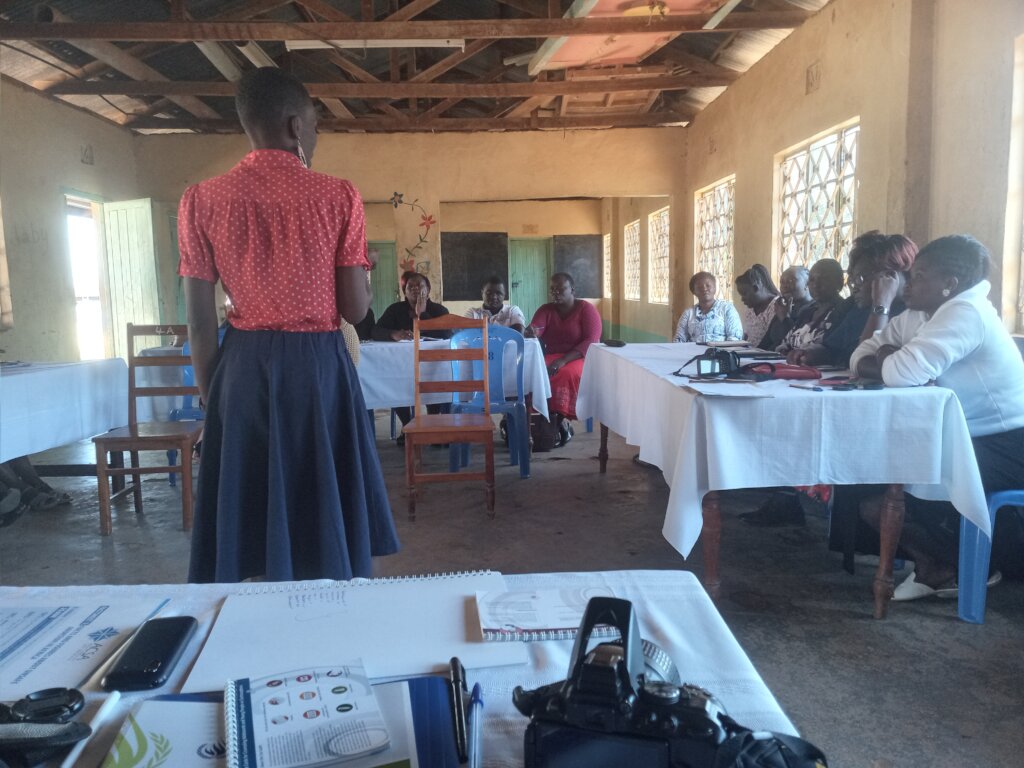By Edwin Nyongesa | Project officer
: ACTIVITY PROCEEDINGS
The purpose of this activity was to increase sustainability by ensuring the beneficiaries have owned the activity for a long and will continue doing after WE REACH exits. WE REACH conducted training for Orphans and Vulnerable Children (OVCs) caregivers on the kitchen garden and how to start a small business in their community. The caregivers were selected because of the learners the organization is supporting in schools so that they can be able to sustain them and the children they take care of. This will go a long way because it will ensure that the families will not go hungry and will have a balanced diet, and also will better their economic status. This will be beneficial especially to the OVCs living with HIV.
Kitchen garden
The caregivers were trained on how they can start and maintain their kitchen garden. It was made clear to them that a kitchen garden is a small shamba or garden near their houses, where they can plant various vegetables and fruits. It was vivid that not any other shamba or garden can be called a kitchen garden.
It came out during the training that a kitchen garden can play a vital role in the sustainability of the family. That is food basket and also financial stability. The caregivers were urged to use the kitchen garden as a source of income-generating activities by selling part of their produce in the local market. This will enable them to acquire other essential needs like clothes, shoes, and school fees among others.
In managing and maintenance of the garden, it was discussed and agreed that they can use the traditional method in yielding more produce by boosting the fertility of the soil by using animal waste and ash to prevent pests from damaging the crops. They were taught how to make compost mature and other organic fertilizers that cannot harm the soil.
Caregivers were urged to text their garden’s soil in order to know the acidity of the soil so that they may decide what is the best crop to plant.
Animal keeping such as poultry farming, dairy farming also bee farming were discussed in detail and the caregivers were encouraged to practice them. One of the participants gave her experience in poultry keeping. She said that the raring of chickens has many benefits. One it gives eggs, meat, and mature for the kitchen garden.
The caregivers who did not have gardens were encouraged to start developing their own because it’s an important initiative in the homestead. This cuts down the budget by 50% of the house. Therefore, making it a ness city for each and every household to embrace.
How to Start a Small Business?
Having or owning a business is one of the ways of earning a living apart from being employed. Owing to the current situation in the country and the world on the Coronavirus pandemic, most of the population has lost their jobs and some are getting half of their salaries. Therefore, participants saw the importance of owning a business in the current crisis of unemployment.
Some questions like what need is there in my community? What can I do to address the need? And also where can I get the capital to address the need? The aspect of getting out of their comfort zone was emphasized in a way that, gives them the motivation to pursue the unknown hoping for a better ending.
Discussion and brainstorming were used to bring out the business opportunity available in their community which is; poultry keeping, selling fruits, vegetables, masks, and liquid hand washing soap among others. Some caregivers have businesses that helped in the discussion on how they started their businesses, their challenges, and their achievements.
They were later trained on how to identify and pick an appropriate location for the business, how to set their prices and how to keep records of what they sell in order to account for profit or loss. Caregivers are important as they can be role models to the children. They are critical in ensuring the children's food and other basic needs are available.
WE REACH took contact with the caregiver and the schools which their children attend in order to follow up on their academic work and well-being. This will help the organization in planning and coming up with strategies to address its problems.
3.0: LESSONS LEARN
4.0 CHALLENGES
5.0: RECOMMENDATIONS AND REQUIRED ACTIONS.
Project reports on GlobalGiving are posted directly to globalgiving.org by Project Leaders as they are completed, generally every 3-4 months. To protect the integrity of these documents, GlobalGiving does not alter them; therefore you may find some language or formatting issues.
If you donate to this project or have donated to this project, you can receive an email when this project posts a report. You can also subscribe for reports without donating.
